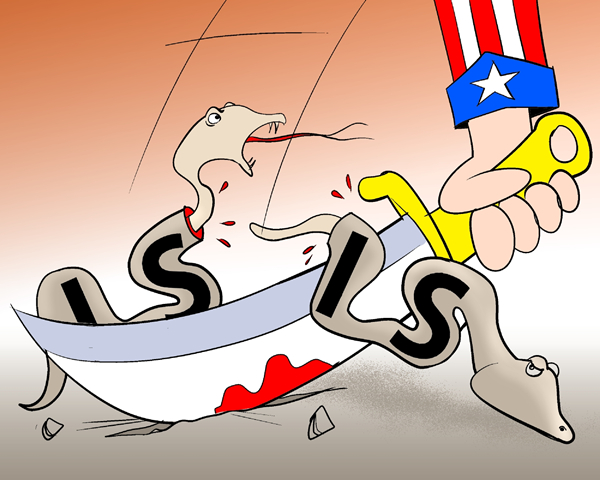Why Obama's Iraq War will turn out no better
- By Mitchell Blatt and Sumantra Maitra
 0 Comment(s)
0 Comment(s) Print
Print E-mail China.org.cn, October 3, 2014
E-mail China.org.cn, October 3, 2014
Three years after President Obama triumphantly announced the withdrawal of U.S. troops from Iraq, America is once again being drawn into an unwise war, not only in that country, but also in Syria.
|
|
|
Hardly a fatal strike [By Jiao Haiyang/China.org.cn] |
The potential for political schadenfreude is endless. This is the president who won the Nobel Peace Prize his first year in office for his belief that, "Dialogue and negotiations are preferred as instruments for resolving even the most difficult international conflicts." This is the politician who, as a Senator, criticized President George W. Bush for overstepping his powers in a time of war. Now he is taking on a military objective that will take years to accomplish, without a vote to authorize war and with a coalition which is only a fraction as large as the one put together by Bush.
All this makes for entertaining political gamesmanship, but there are real people getting killed on the ground, and this situation affects everyone, regardless of one's political views. Unfortunately, the strategic outlook for this new conflict is almost as bad as the political outlook. Obama's confused military strategy reflects his confused political strategy.
Conspicuously absent from the five-country coalition that first struck Syria was Iran, which, as a Shia country and a supporter of Iraq's Shia government, is directly threatened by ISIS. In essence, Iran is getting a free ride courtesy of its geopolitical enemy. A more Machiavellian plan might have had Iran take on the bulk of the security responsibility against ISIS. After all, Iran already has benefited greatly from the overthrow of the Sunni Saddam Hussein and stands to gain from a stable Shia-led Iraq. But that would complicate things for America's Arab allies and their goals in Syria.
All the coalition members are Sunni-led states that resent Iran's regional power. Moreover, they all oppose the Shia Bashar Al Assad regime in Syria. They have been supplying weapons to the rebels, including ISIS and other extremist groups. But now ISIS has turned into a threat to these coalition members, and their objective of toppling Assad can ultimately be accomplished by supporting America's arming of the Free Syrian Army.
In short, it is a complicated situation for which the U.S. has no clear strategy, and which is therefore susceptible to mission creep. The United States is bombing some of Assad's most virulent enemies just one year after Obama failed to build support for bombing Assad, while at the same time arming the main "moderate" forces fighting Assad.
How moderate these forces are or were is really anyone's guess. Defense Secretary John Kerry's Congressional testimony that, "We can talk more about the moderate opposition … as we go forward," did not prove reassuring. It sounds like the U.S. plan is being made on the fly.







Go to Forum >>0 Comment(s)